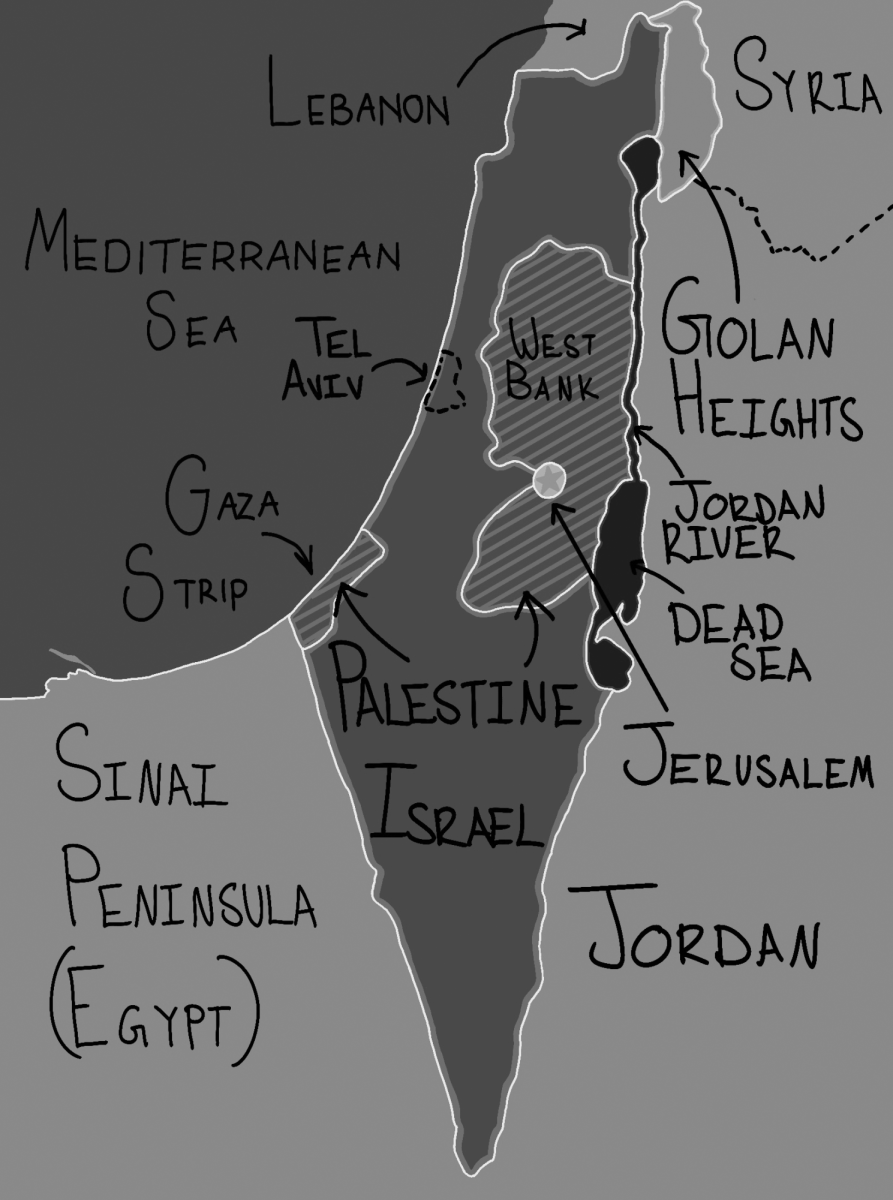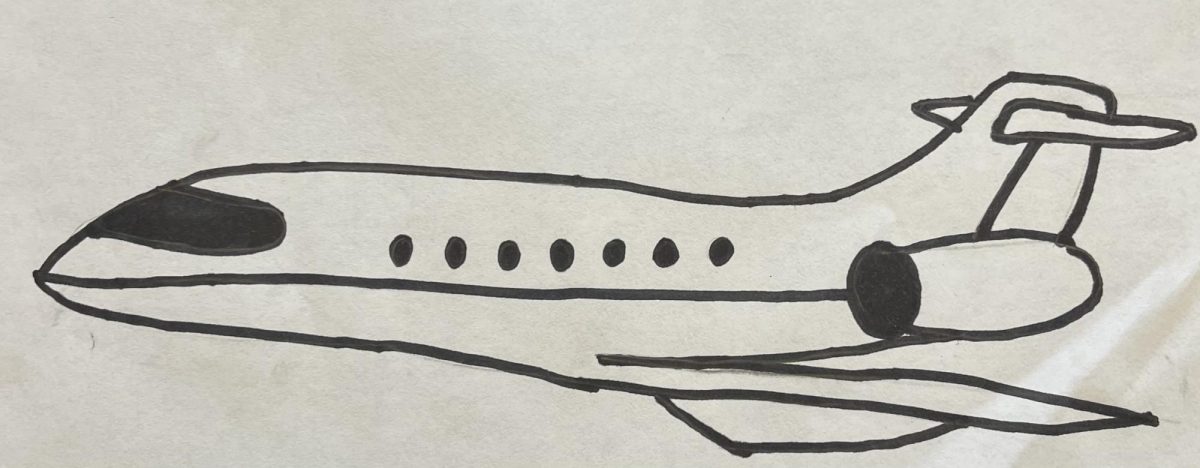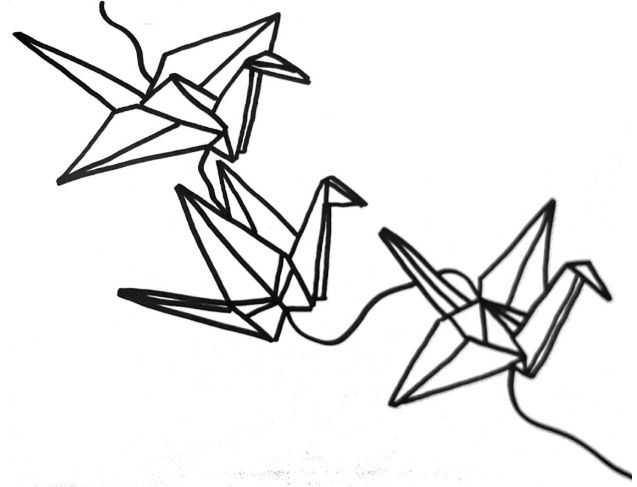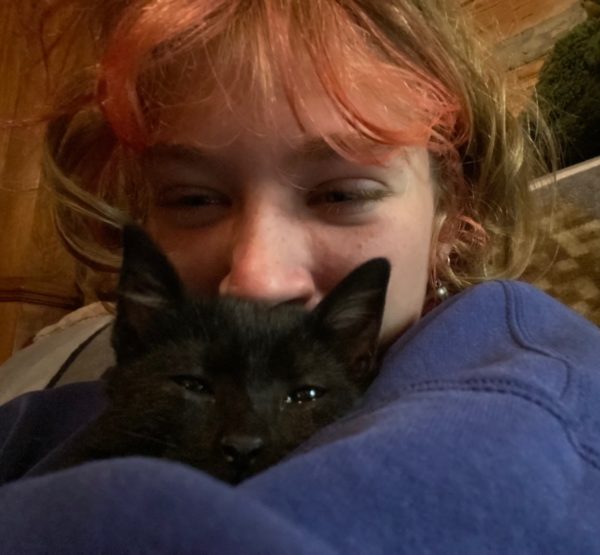On October 7, 2023, Palestinian Hamas militants launched an attack on southern Israel, killing over 1,200 Israelis and taking over 240 hostage, according to Israeli officials. Israel responded with an intense bombardment of the Gaza Strip and a ground invasion of Gaza. The Gaza Health Ministry reports that over 15,000 Palestinians have been killed since Oct. 7. Civilians account for the majority of casualties on both sides.
The divisions between Israel and Palestine extend far past the events of Oct. 7. It is imperative to know the dense history of the two states to fully understand the events of today.
A Brief History of Israel-Palestine Relations
Early History
After the Roman Empire conquered the region in 63 B.C., the Jewish-Roman wars resulted in the expulsion of the Jewish population from the Israel-Palestine region. Various empires conquered the region in consequent years, but eventually, the Islamic Ottoman Empire conquered the region, ruling from 1517 to 1917.
A Jewish State
The Israel – Palestine region had a Jewish minority and an Arab majority before a large influx of Jews, fleeing persecution in Europe, arrived during the early to mid-1900s. In the 1917 Balfour Declaration, the British government called for the establishment of a “national home for Jewish people” in Palestine. After WWI, the League of Nations agreed to allow Britain temporary rule over Palestine until a Jewish state was created. In 1947, the United Nations proposed a partition of Palestine into three parts: a Jewish state, an Arab state, and a UN-controlled Jerusalem. Although Jewish leaders accepted the plan, Arab leaders rejected it.
The 1948 Arab-Israeli War
The following year, Britain withdrew from Palestine, and Jewish leaders declared the creation of the State of Israel. War soon broke out. Israel fought against the Arab League, which consisted of neighboring Arab-majority countries. By the end of the 1948 Arab-Israeli War, while Israel gained large amounts of territory, Egypt controlled the Gaza Strip, and Jordan occupied the West Bank. Palestinians refer to the war as the Nakba, or “the catastrophe,” because of the mass displacement and dispossession they faced after the war. Jerusalem was also divided into two, with West Jerusalem under Israeli control and East Jerusalem under Jordanian control. Even though multiple clauses in the post-war Armistice Agreements specified that Israelis would have access to religious sites in East Jerusalem, Jordan prevented Jews from entering various sacred places, saying that Israel’s obstruction of Palestinian refugees’ ability to return to their West Jerusalem homes voided the clauses.
The Six-Day War
Tensions remained high, especially after the 1956 Suez Crisis, where Israel invaded Egypt, and eventually, the Six-Day War further shook up territorial boundaries. Israel’s territory expanded to consist of the Sinai Peninsula, Gaza Strip, West Bank, and the Golan Heights. After the war, the Israeli National Unity Government voted to return the Sinai to Egypt and the Golan Heights to Syria in exchange for a peace plan involving demilitarization, but the agreement never went through due to the post-war Khartoum Resolution, where 13 Arab countries concluded upon “The 3 No’s”: No peace with Israel, no recognition of Israel, and no negotiation with Israel. Violence continued in the following years, resulting in the deaths of tens of thousands and the displacement of millions.
The Camp David Accords
Peace talks resumed in 1978 during the Camp David Accords, where Egypt and Israel’s leaders signed an agreement brokered by President Jimmy Carter that formed the framework for a peace treaty between the two countries and widespread conciliation in the Middle East. The two leaders further agreed upon the eventual creation of a Palestinian self-government to replace Israel’s military and political involvement in the occupied territories. Additionally, Israel returned the Sinai Peninsula to Egypt, and Egypt became the first Arab country to recognize Israel as a state. In turn, the Camp David Accords offered a glimmer of hope for the future of Arab-Israeli relations.
Ongoing Tensions
Despite the strides made toward peace, hostility remained between the Israelis and Palestinians. Ever since the Six-Day War, Israel has built settlements on occupied lands, sparking condemnation from Palestinians, the United Nations, and the European Union. Intensified Israeli military occupation in the West Bank and the Gaza Strip led to the First Intifada spanning from 1987 to 1993 after an Israel Defense Forces (IDF) truck collision killed four Palestinian civilians. Rumors spread that the accident was planned by Israel because an Israeli was murdered by a Palestinian the day before. Palestinians responded with various tactics including protests, riots, strikes, and boycotts. Notably, Hamas, an Islamist militant group, was formed during this time. Hamas believed in armed resistance against Israel to attain the territory from the Mediterranean Sea to the River Jordan. During the First Intifada, Hamas was responsible for multiple targeted killings. Israel deployed thousands of troops in response to the continuing violence and unrest. Over the six-year duration of the uprising, nearly 2,000 people died. The ratio of Palestinian deaths to Israeli deaths was approximately 3:1.
The Oslo Accords
The 1993 Oslo Accords marked the end of the First Intifada, creating the self-governing Palestinian Authority and an outline for the eventual withdrawal of Israeli military forces from Palestinian territories. Israel recognized the Palestinian Liberation Organization (PLO) as the representative of the Palestinian people, and the PLO recognized the state of Israel. The Oslo Accords were unpopular among some Israelis and Palestinians. In 1995, Israeli citizen Yigal Amir, who opposed the Oslo Accords and any withdrawal from Palestine, murdered Israeli President Tel Aviv-Yafo. Hamas also opposed the agreement and launched multiple suicide bombings during this time.
Rise of Hamas
The failure of the 2000 Camp David Summit set the stage for the even deadlier Second Intifada that lasted until 2005. In 2005, Israel completely withdrew from the Gaza Strip and in 2006, Hamas was elected to govern the Gaza Strip. Following the election, Israel and Egypt imposed a blockade on Gaza in an attempt to stop Hamas from obtaining weapons. However, these blockades also restricted the transportation of essential goods and led to significant economic troubles for Gaza’s citizens.
Student Voices
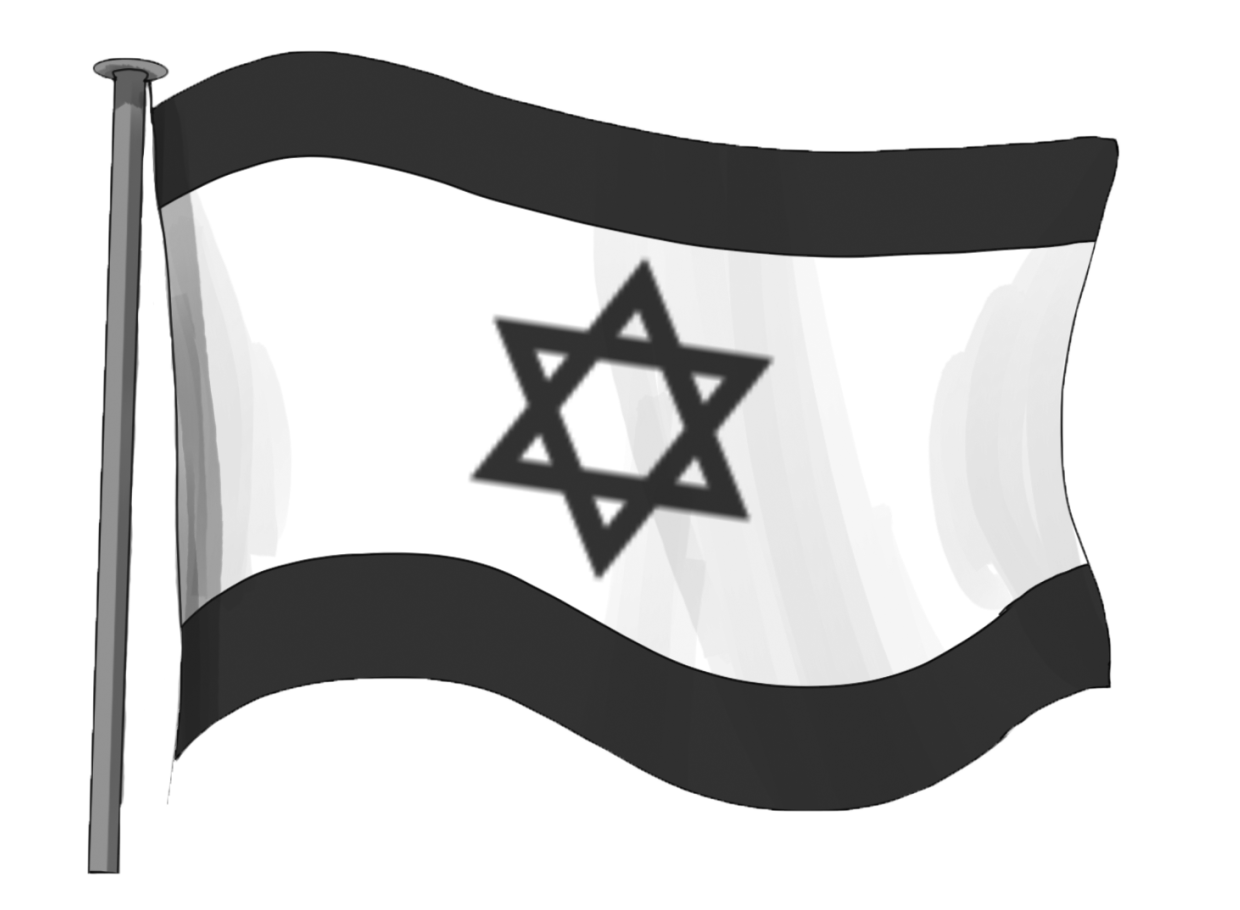
Although Israel and Palestine are thousands of miles away, the impacts of the events in
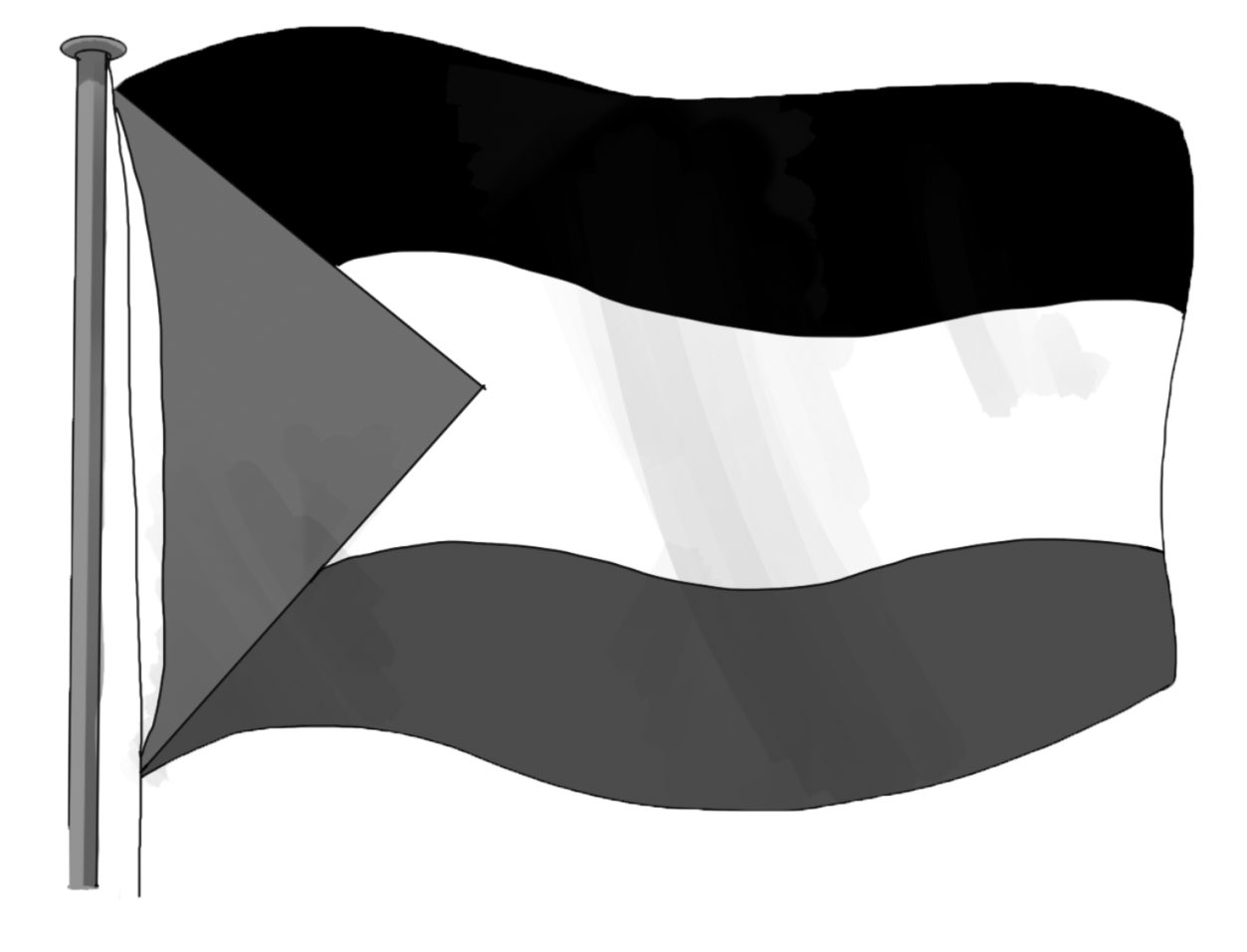
Gaza are seen even in our local community. The Messenger interviewed three people – one of the Jewish Student Union (JSU) presidents, a Muslim Student Association (MSA) officer, and a co-organizer of the GHS for Palestine walk-out – for the following section.
Ella Nestingen, Co-president of the Jewish Student Union, spent a month in Israel a couple of years ago, traveling the country and forming friendships. “It was a very powerful experience for me. I really felt a connection with Israel,” Nestingen said. She said the reaction to the events in Gaza is “overwhelming” because “it really feels very polarized, like either you want the State of Israel to not exist … or [to] destroy Hamas at all costs. I feel like there hasn’t been too much of that at Garfield, which has been nice.” However, Nestingen still sees polarization in the way her friends view the events in Gaza. “I have certain Jewish friends that are very upset about this issue from a pro-Israel lens, where they’re like: ‘The Hamas attack was the worst thing to happen [to Israelis] since the Holocaust,’” Nestingen said. “But then, I also interact with people that think Israel, as a concept, is completely not okay. … That frustrates me too, because that’s like destroying the Jewish state. Like, that’s the same idea where the Holocaust came from.”
Nestingen sees the effects of the events in Gaza in Seattle. During JSU meetings, “We try not to get into politics, [but] I know that this issue is greater than politics,” Nestingen said. “There was a synagogue. I can’t remember which one, but one of them [had] hate speech on it, and that was really disturbing because I have friends that go there,” she said. “We just want to be a supportive space for Jewish youth at Garfield… And so, we have discussed it at our meetings, but we want to make this a space where people can just feel safe and comfortable.”
Salsabila Abu, an officer in the Muslim Student Association, discussed the gravity of the situation. “What’s happening between Israel and Palestine is not something so small [as] to be called a conflict. It’s so much more than just a disagreement between them,” Abu said. She hopes the war will be a “mind-opening moment with just how much you see the media try to distort history in front of our eyes and simply just expect us to believe it.”
Furthermore, Abu advises people to “be aware of [their] own biases” and warns against using “it’s complicated” as an excuse for not speaking out. “There is so much proof out there about what’s happening, you just need to see it,” Abu said. “There are so many journalists in Gaza, risking themselves and their families… and you can see live-footage of what’s happening on social media, even though the platforms have been trying to censor them.”
Abu asserted that the events in Gaza are not entirely founded in religious divisions. “I believe that what’s happening in Gaza is a genocide and that Gaza itself is a concentration camp,” Abu said. “Being anti-Zionist is far from being anti-Semitic, and the narrative that has been pushed about that has no backing. And if nothing I say goes through [the] people that believe that, I’m still going to say: ‘Free Palestine.’”
MSA members are “transparent” with their thoughts and “let each other know of any updates [they] come across,” Abu said. Currently, MSA plans to hold a fundraiser for the people in Gaza after winter break.
On October 25, dozens of Garfield students participated in a walk-out for Palestine and silent vigil for lost Israeli and Palestinian lives organized by seniors Maysun Dawahare, Nola Watson, and August Donita. “It’s not about wanting Palestine to take over Israel… It’s more about Israel not killing them and keeping them in one area… and that has nothing to do with Israelis, it’s just the Israeli government. And I think that’s something people need to understand, and I want people to spread awareness about that,” Dawahare said.
Dawahare has “noticed a divide between Garfield students and strains between friendships and communities.” After the walk-out, Dawahare said they have received some adverse reactions. “People in the halls do a side-eye at me because they know that I’ve co-organized this with August.”
Even still, Dawahare stresses the importance of discussing the conflict. “Since it’s such a sensitive topic, people just avoid talking about it,” Dawahare said, “but it’s also a subject that needs to be addressed.”
Garfield students can advocate for their beliefs in many ways. “Whatever side you’re on, you can write letters to your congressman. You can protest. There’s a lot of money that goes to funding Israel. And so, if you’re against their attack on Gaza, you can try to address companies and stuff that are sending support and weapons to Israel,” Nestingen said. Students should also “vote diligently as well as research diligently,” Abu said. “Just support as much as you can, whether it be through information, financial aid, or just having a conversation,” Dawahare said.



